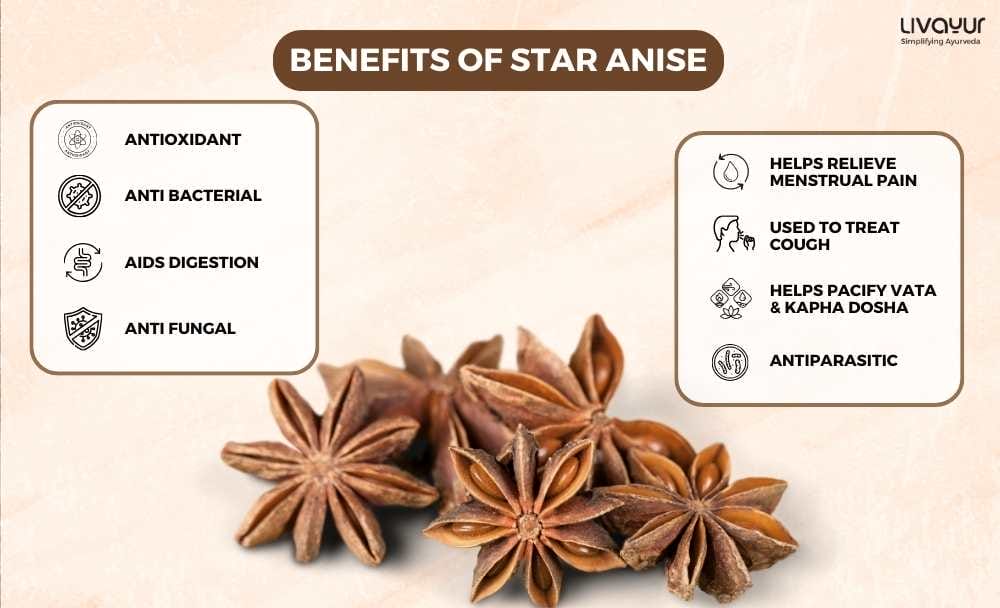This article is reviewed by experts

Star anise, scientifically known as Illicium verum [1], is a unique spice that is widely used in various cuisines for its distinct flavor and aromatic properties. Apart from its culinary uses, star anise also offers a range of potential health benefits.
Star Anise – Ayurveda
It has significance in traditional medical systems like Ayurveda. According to this age-old holistic approach, star anise is a powerful herb with many medicinal uses. It’s commonly used in Ayurveda to regulate body processes, ease coughs, and help with digestion. It also pacifies the Kapha and Vata doshas. Because of its natural components, which are believed to have anti-inflammatory, antibacterial, and antioxidant qualities, it is a highly regarded component of many Ayurvedic treatments.
This article explores the star anise benefits, uses, and potential side effects of star anise, drawing references from reliable sources.
Benefits of Star Anise
1. Digestive Aid
Primary Benefit: Star anise contains compounds that can aid in digestion, alleviate indigestion, and reduce bloating.
Secondary Benefit: The essential oils in star anise may help relieve stomach cramps and support overall digestive health [1].
2. Respiratory Health Support
Primary Benefit: Star anise exhibits expectorant properties, making it beneficial for respiratory conditions such as coughs and bronchitis.
Secondary Benefit: The active compounds in star anise can help loosen mucus and facilitate its expulsion, providing relief from respiratory congestion [1].
3. Antimicrobial Effects
Primary Benefit: Star anise possesses antimicrobial properties that can inhibit the growth of various pathogens.
Secondary Benefit: The natural compounds in star anise may help combat bacterial and fungal infections, promoting overall immune health [1].
4. Anti-Inflammatory Properties
Primary Benefit: Star anise contains compounds with anti-inflammatory effects, helping to reduce inflammation in the body.
Secondary Benefit: Regular consumption of star anise may contribute to the management of inflammatory conditions [1].
5. Rich in Antioxidants
Primary Benefit: Star anise is a potent source of antioxidants that can help neutralize harmful free radicals in the body.
Secondary Benefit: The antioxidants present in star anise may offer protection against oxidative stress and support cellular health [2].
6. Improved Sleep Quality
Primary Benefit: Star anise contains compounds that possess sedative properties, aiding in relaxation and promoting better sleep.
Secondary Benefit: Consuming star anise or its essential oil may help individuals with insomnia or sleep disturbances achieve a more restful sleep [1].
7. Oral Health Promotion
Primary Benefit: Star anise has natural antiseptic properties, making it beneficial for oral health.
Secondary Benefit: Chewing star anise or using its essential oil as a mouthwash may help combat bad breath and prevent oral infections [1].
Nutritional Value of Star Anise
| Nutritional Component | Value (Per 100g) |
| Dietary Fibre | 15 g |
| Protein | 18 g |
| Calcium | 646 mg |
| Iron | 37 mg |
| Sodium | 16 mg |
| Potassium | 1441 mg |
| Total carbohydrate | 50 g |
| Saturated Fat | 0.6 g |
| Total Fat | 16 g |
Uses of Star Anise
Aside from its medicinal benefits, star anise uses are widespread as a spice in various cuisines worldwide. Its distinct flavour adds a liquorice-like sweetness to both sweet and savoury dishes. In culinary applications, star anise is commonly used in [3]:
1. Asian Cuisine
Star anise is a key ingredient in Chinese five-spice powder, imparting its unique flavor to stir-fries, soups, and braised dishes.
2. Baking and Desserts
Star anise can enhance the flavor of baked goods, such as cookies and cakes. It is also used in making mulled wine and spiced tea.
3. Broths and Stews
Adding star anise to broths and stews gives them a warm and aromatic profile. It is commonly used in pho, a popular Vietnamese noodle soup.
4. Beverages
Star anise is used to flavor various beverages, including herbal teas, mulled wine, and spiced cider. It adds a delightful aroma and a hint of sweetness to these drinks.
5. Pickling and Preserving
Star anise is a popular ingredient in pickling recipes, as its flavors infuse well with preserved vegetables and fruits, providing a unique tangy taste.
6. Infused Oils and Vinegar
Star anise can be used to infuse oils and vinegar, creating flavorful bases for dressings, marinades, and dipping sauces.
7. Confectionery
Star anise is utilized in the production of candies, flavored syrups, and liqueurs, such as absinthe and anise-flavored spirits.
Side Effects
While star anise offers numerous health benefits, it is important to exercise caution and be aware of potential side effects associated with its use [3,4].
1. Allergies
Some individuals may be allergic to star anise, leading to allergic reactions such as skin rashes, itching, or respiratory distress.
2. Pregnancy and Breastfeeding
Pregnant and breastfeeding women should consult their healthcare providers before consuming star anise due to its potential effects on hormone levels.
3. Neurotoxicity
Star anise contains a compound called anethole, which in large quantities, can have neurotoxic effects. It is important to use star anise in moderation and avoid excessive consumption.
4. Drug Interactions
Star anise may interact with certain medications, including anticoagulants and blood pressure-lowering drugs. It is advisable to consult a healthcare professional before using star anise if you are taking any medications.
Precautions
While there are many star anise benefits, it is important to practice precautions in case of side effects or medical conditions.
Allergies
It is advisable to perform a patch test before using star anise or its essential oil topically.
Children
When consumed in excessive quantities, the chemicals in star anise can be detrimental to newborns and early children. Giving star anise to newborns or young children is not advised.
Medication Interactions
Star anise may interfere with some drugs, especially those that the liver processes. Before eating star anise on a regular basis if you are taking any medications, especially ones that process the liver, speak with a healthcare provider.
Quality and Source
Be sure the supplier of the star anise you’re buying from is trustworthy. When it is tainted or of low quality it may be harmful to your health. Star anise tea’s side effects (when contaminated with Japanese star anise which is poisonous) can cause vomiting and seizures.
Before using star anise, or any other herb or spice, in your diet, always get advice from a medical expert or a trained herbalist. This is especially important if you have any underlying health conditions or are concerned about possible interactions.
Conclusion
In conclusion, star anise is not only a versatile spice used in culinary preparations but also offers potential health benefits. Its primary benefits include aiding digestion, supporting respiratory health, possessing antimicrobial and anti-inflammatory properties, and being rich in antioxidants. Additionally, star anise may provide relief from menstrual symptoms, promote better sleep quality, and contribute to oral health.
When using star anise, it is important to be cautious of potential side effects, allergies, and drug interactions. It is always recommended to consult with a healthcare professional or a qualified herbalist before incorporating star anise into your diet or using it for medicinal purposes.
With its unique flavor and potential health-promoting properties, star anise can add a delightful touch to your culinary creations while potentially benefiting your well-being.
FAQs
1) What are the uses of Star Anise?
• While Star Anise has many culinary and therapeutic uses like adding a distinct flavor profile to liquids such as teas, broths, or syrups by infusing tastes into them and star anise in Ayurveda is used to treat cold and cough.
• It is also used in desserts and baked items including cakes and cookies, to improve flavour. It is also added to Spiced tea and mulled wine.
2) Can you give star anise to infants?
Star anise contains compounds that can be harmful to babies and young children if ingested in excess. It is not advisable to give star anise to infants or young children.
3) Can you eat star anise during pregnancy?
• Similar to coffee, minimal quantities of fennel and star anise can be safe to use while pregnant.
• However, anise seed may raise the risk of an early labor in certain women with high-risk or complex pregnancies, so it may be preferable to stay away from it completely.
4) Can star anise cause any side effects?
Pure Chinese star anise is safe for most people. There haven’t been many reports of allergic reactions.
However, a closer relative of the Chinese spice that poses a greater risk to the general public is the extremely poisonous Japanese star anise.
While star anise adds a flavourful touch to the kitchen and has medicinal benefits, there are certain kinds of star anise that are poisonous, so it is important to know your source.
References:
- https://www.ncbi.nlm.nih.gov/pmc/articles/PMC8839413/
- https://www.researchgate.net/publication/259844389_The_antioxidant_and_DNA_protectant_activities_of_Star_Anise_Illicium_verum_aqueous_extracts
- https://www.healthline.com/nutrition/star-anise#culinary-uses
- https://www.webmd.com/vitamins/ai/ingredientmono-364/star-anise













